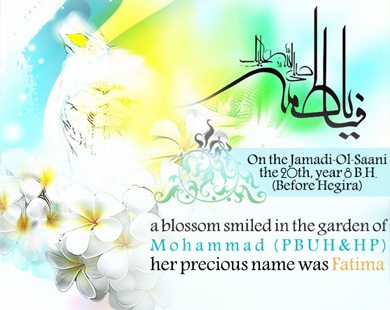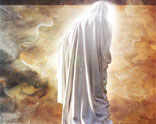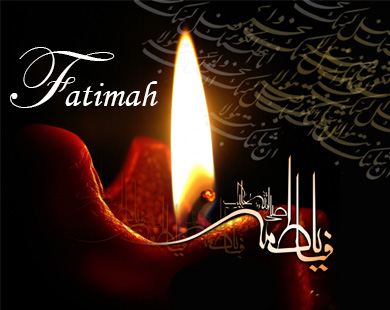As we have already mentioned, one of Fatima Zahra's (A) names was "At Taherah" (the virtuous or pure). This meaning is related to the verse:
(And Allah only wished to remove all abomination from you, ye member of the Family, and to make you pure and spotless.) (33: 33)
The above-mentioned verse is of great importance because of its subtle meaning and significance.
This verse is considered the main source of virtues granted to Ahlul-Bayt (A); around it various debates and many writings took place. It might be more appropriate to say that this verse was the field of debates, contradicting viewpoints and inconsistent opinions. This is especially true when it comes to who was meant by "the Family," or Ahlul-Bayt.
Nevertheless, it is indisputable that this verse, known as "the verse of purification" concerns Fatima Al-Taherah (A) and both Shiite and Sunni scholars agree on this, except a very small number. This established fact has been reached in light of the traditions, which unanimously state that the said verse includes Ali, Fatima, Al-Hassan and Al-Hussain (A). Yet some hold the viewpoint that the verse includes the Prophet's wives-because of the word "Family" and the sequence of the surrounding verses that include a speech to them; however, he (S) prohibited even his wife, Umme Salama, from joining them under the cloak prior to the revelation of this verse.
Although the number of narrators who report that the "verse of purification" was revealed regarding Ali, Fatima, Al-Hassan and Al-Hussain (A) reach several hundreds, it will be useful to include narrations and sources which are reported by prominent Sunni scholars about this subject. I would like to point out that this list should be satisfying for any clear conscience.
1. Baghdadi in his history book Tareekh Baghdad, v. 10, mentioned that Abu Sa'id Al-Khudari remarked regarding the verse:
(And Allah only wished to remove all abomination from you, ye members of the Family and to make you pure and spotless,)
that the Messenger of Allah gathered Ali, Fatima, Al-Hassan and Al-Hussain under a cloak and said:
"These are my Ahlul-Bayt (i.e., Family), O Allah; remove all abominations from them and make them pure and spotless "
Umme Salama, who was standing near the door, said:
"Am I not one of them, O Messenger of Allah?"
He said: "You are (up to a) good ending."
2. Zamakhshari in Al-Kashaf, v.1, p. 193 narrated on the account of Aisha, that Allah's Messenger came out wearing an embroidered, ornamented cloak of woven black hair, when Al-Hassan Ibn Ali came to him and went under it; then Al-Hussain followed him, then Fatima, then Ali. At that moment (S) quoted the verse:
(And Allah only wished to remove all abominations from you, ye Members of the Family, and to make you pure and spotless.)
3. Razi in his interpretation of the Quran v. 2, p. 700, (printed in Istanbul), writes:
"When he (the Prophet) came out wearing the black cloak, and Al-Hassan came under it and Al-Hussain, and Fatima and Ali the Prophet said: 'And Allah only wishes......"
4. Ibn Al-Athir Al-Jazari reported in his book Usd al-Ghaba Fi Maarefat As-Sahabah v. 2, p. 12, that Omar Ibn Abu Salamah, the Prophet's stepson, said:
"When the verse And Allah only wishes...' was revealed to the Prophet (S) he had gathered Fatima, Hassan and Hussain under his cloak, while Ali was behind him, and said:
`This is my family, therefore, remove all abomination from them, and make them pure and spotless.'
Umme Salama said: Am I one of them, Messenger of Allah?' He said: 'You will be in good condition."
5. Sebt Ibn al-Jawzi reported in Tazkerah al-Aemah, p.244, that Wathelah Ibn Asqa' said:
"I went to ask Fatima (A) about Ali; she told me to go to the Messenger of Allah (S) and ask him, so I went and sat down to wait for him; I then saw the Prophet coming in the company of Ali, Al-Hassan and Al-Hussain. He held their hands until they entered the room. He then sat Al-Hassan on his right leg and Al-Hussain on his left leg and ordered Ali and Fatima to sit near him. The Prophet (S) covered them with his cloak (or garment) and read: And Allah only wishes... than he (S)) supplicated to Allah and said:
"O Allah, truly these are my Ahlul-Bayt (Family)."
6. Imam Wahedi reported in his book Asbab An-Nozul that Umme Salama, the Prophet's wife, narrated that Allah's Messenger (S) was present in her house when Fatima brought him an earthenware pot filled with wheat cooked with milk. He (S) said: "Call in your husband and two sons for me." Thus, Ali, Al-Hassan and Al-Hussain came and joined him in eating the food. Meanwhile, he (S) sat on a bench, covered with a Khairban cloak.
Umme Salama added: "I was in my room performing prayers when the Arch-Angel Gabriel revealed:
"O Allah, these are my Family and Kin; therefore, remove all abomination from them and make them pure and spotless."
At hearing that, I looked in the house and said: "Am I one of them, O Apostle of Allah?'
Moreover, Tirmadhi reported in his "Sahih" that Allah's Messenger since the time this verse was revealed and for six months
thereafter, stood by Fatima's house (door) and said:
"(Time for) prayers Ahlul-Bayt; Allah only wished to remove all abomination from you and make you pure and spotless."
7. Ibn Sabagh al-Maliki in his book al-Fosoul al-Muhemah p.7, narrated a tradition similar to the one already mentioned by Wahidi; but he added: Some poets said the following in this regard:
Surely Muhammad and his successor and
Their two sons, and his virtuous and pure daughter;
are the people of the cloak who in adhering to them, I long for
peace and success on the Last Day.
8. Abu Bakr Suyuti narrated this tradition on the authority of Umme Salama, Aisha, Abu Sa'id Al-Khudari, Zeid Ibn Arqam, Ibn Abbas, Dahak Ibn Muzahim, Abu al-Hamra, Omar Ibn Salama and others in his books: al-Durr al-Manthur v. 5, p. 198, Al-Khasaes al-Kubra v. 2, p. 264, and Al-Itqan v. 2, p. 200.
They all reported that the Prophet (S) gathered Fatima, Ali, Al-Hassan and Al-Hussain, when the verse 'And Allah only wishes to remove... " and covered them with a cloak.
He then said: "By Allah, these are my Ahlul-Bayt, therefore remove all abomination from them pure and spotless."
9. Tabari in Dhakhaer al-Uqbi p. 21, declared that this verse was revealed in regard to the purified five (the Prophet, Ali, Fatima, Hassan, Hussain), relying on Omar Ibn Abu Salama's narration.
He also reported that Umme Salama said:
"Allah's Messenger covered Fatima, Ali, Al-Hassan and Al-Hussain, including himself with a garment and read this verse:
(And Allah only wished to remove all abomination from you, ye Members of the Family, and to make you pure and spotless.) (33: 33)
She then added: "So I came to join them when the Prophet (S) said: 'Stay where you are, you will have a good conclusion."
In another narration, she was quoted as saying:
"Allah's Messenger said to Fatima: 'Bring your bright cloak; and put his hands on them and said:
'O Allah, these are the progeny of Muhammad, thus bless and praise them for surely you are praiseworthy and Exalted."'
Umme Salama added:
"I then lifted the cloak to join them, but he pulled it away and said: You are alright. "
10. Muhammad Ibn Ahmad Al-Ghoutroubi reported that this verse was revealed in regard to Ahlul-Bayt (A) in his book Al-Jame' Li Ahkam al-Quran v.14, p.182.
11. Ibn al-Arabi in his book Ahkam al-Quran v. 2, p. 166.
12. Ibn Abd al-Bir al-Ondolosi in his book al-Esti'ab v. 2, p. 460.
13. Al-Bihaqi in his book As Sunan al-Kubra v., p. 149.
14. Al-Hakim al-Nishaburi in his book al-Mustadrak al- Sahihain v.2, p.416.
He narrated a tradition on the authority of Umme Salama similar to what has already been mentioned and...
He (S) said: "O Allah, this is my family (Ahlul-Bayt)."
Umme Salama then said:
"Messenger of Allah, am I not from Ablul-Bayt?"
The Prophet answered:
"You are alright, but these are my Ahlul-Bayt..."
15. Ahmad Ibn Hanbal in Musnad v. 1, p. 331.
16. Nisaee in Khasa'es p. 4.
17. Muhammad Ibn Jarir At Tabari in his interpretation of the Quran, v. 22, p. 5.
18. A1-Khawarazmi in Kitab al-Manaqib p. 35.
19. Al-Haithami in Majma' al-Zawaed v. 9, p. 166.
20. Ibn Hajar al-Haithami in al-Sawa'iq al-Muhriqa p. 85.
It is necessary to further elaborate on this subject, since the verse of purification declares, beyond doubt, that Fatima (A) is pure. Nevertheless, it may be beneficial to explain the meaning of the word "Rijs" or abomination mentioned in the verse.
"Rijs" means that Allah purified her from the monthly menstruation in addition to all abomination and depravities. "Rijs" is all that is deemed impure by human nature, conforms with evil doings, deserves punishment, detracts from one's good reputation, brings about sins, rejected by nature or mars any of the knightly virtues.
Ibn Al-Arabi also said in Al-Futouhat al-Makkiah, Chapter 29, that Rijs is "anything which detracts from one's character."
The definition that Al-Arabi gave for the word Rijs, is the definition for the word "infallible" which the Shiites believe is an inseparable character of all Prophets, Imams, and Lady Fatima Zahra (A). It is indeed an excellent virtue and a great honor that Allah has bestowed upon some of his servants.
It is worthy to mention that infallibility is an inseparable trait of those who propagate divine laws; yet, because infallibility is a prerequisite for prophets and Imams in their roles of propagating divine rules, it does not mean that others, who also propagate, are safeguarded from sins.
Imam Ali (A) proved Fatima's infallibility using the verse of purification in his argument with Abu Bakr.
The Imam (A) said: "Abu Bakr, do you read Allah's book?"
He answered: "yes"
Imam Ali (A) then said: "Then tell me about whom was the following verse revealed?
(And Allah only wishes to remove all abomination from you, ye Members of the Family, and make you pure and spotless.)
"Was it not revealed in regard to us, Ahlul-Bayt?"
Abu Bakr said: "Yes, it was revealed regarding you"
He (A) said: "If some men testify that Fatima, the Messenger's daughter, committed an abomination what would you do?"
He answered: "I would administer the legal punishment to her, just like any other Muslim woman!'
He (A) then said: "If you did so, you would be an infidel in the eyes of Allah."
Abu Bakr said: "Why?"
Imam (A) replied: "Because you would have rejected Allah's testimony of her purity and virtue (infallibility), and surpassed people's testimony over it..."1
A manifestation of this purity, is safeguarding the person from impurity upon death, regardless of the fact that any human being-no matter how pious and obedient to Allah he is-becomes intensely impure upon passing away, making it obligatory to perform ablution (Ghusl) when touching his body. The dead person, himself, only becomes pure after being washed by others.
Contrarily, the infallibles are purified before and after death. Al-Hassan Ibn Ubaid said in Al-Wasa'el:
I wrote to Imam Sadiq (A) and asked him:
"Did the Commander of the Faithful perform ablution (Ghusl) after abluting the Messenger of Allah (S) upon his death?"
His answer was:
"The Prophet was pure and safeguarded all impurities; yet the Commander of the Faithful (A) did so and this became a customary practice (Sunnah)."
We will elaborate on Fatima's ablution at the end of the book if Allah wills.
* Fatima ['a] The Gracious.By Abu Muhammad Ordoni.Published by: Ansariyan Publications Qum, The Islamic Republic of Iran. Reproduced with permission by the Ahlul Bayt Digital Islamic Library Project team.
1- Al-Bihar: v.10.


















